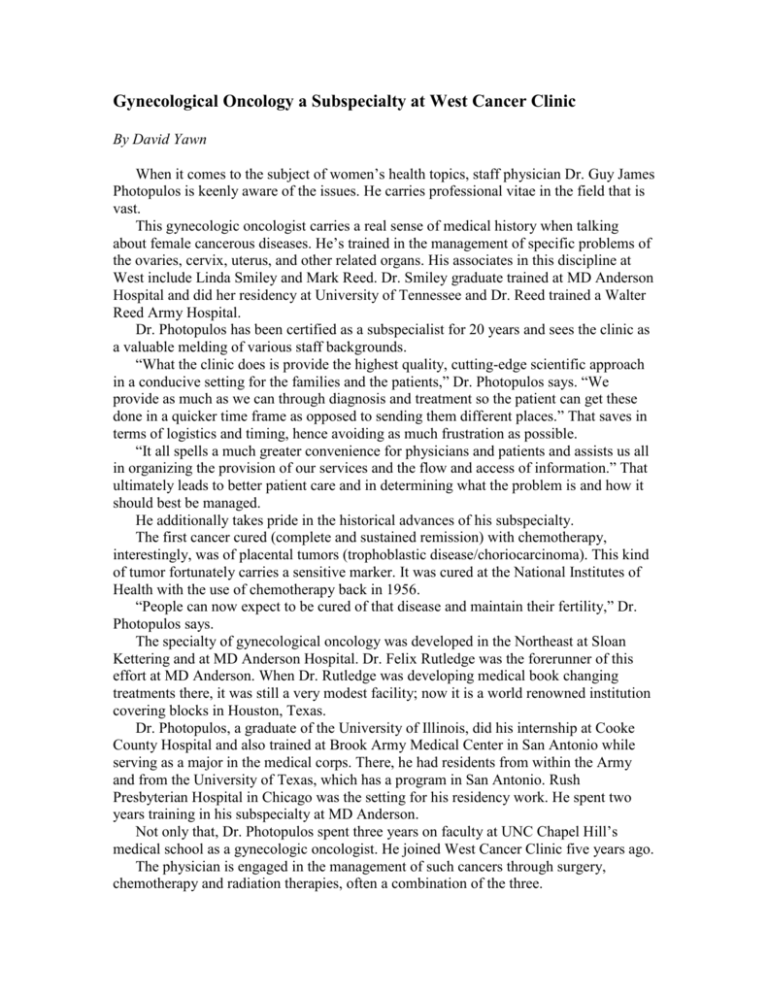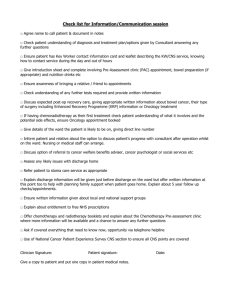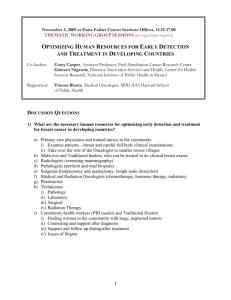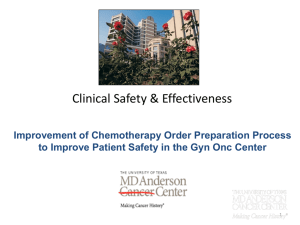Gynecological Oncology a Subspecialty at West Cancer Clinic
advertisement

Gynecological Oncology a Subspecialty at West Cancer Clinic By David Yawn When it comes to the subject of women’s health topics, staff physician Dr. Guy James Photopulos is keenly aware of the issues. He carries professional vitae in the field that is vast. This gynecologic oncologist carries a real sense of medical history when talking about female cancerous diseases. He’s trained in the management of specific problems of the ovaries, cervix, uterus, and other related organs. His associates in this discipline at West include Linda Smiley and Mark Reed. Dr. Smiley graduate trained at MD Anderson Hospital and did her residency at University of Tennessee and Dr. Reed trained a Walter Reed Army Hospital. Dr. Photopulos has been certified as a subspecialist for 20 years and sees the clinic as a valuable melding of various staff backgrounds. “What the clinic does is provide the highest quality, cutting-edge scientific approach in a conducive setting for the families and the patients,” Dr. Photopulos says. “We provide as much as we can through diagnosis and treatment so the patient can get these done in a quicker time frame as opposed to sending them different places.” That saves in terms of logistics and timing, hence avoiding as much frustration as possible. “It all spells a much greater convenience for physicians and patients and assists us all in organizing the provision of our services and the flow and access of information.” That ultimately leads to better patient care and in determining what the problem is and how it should best be managed. He additionally takes pride in the historical advances of his subspecialty. The first cancer cured (complete and sustained remission) with chemotherapy, interestingly, was of placental tumors (trophoblastic disease/choriocarcinoma). This kind of tumor fortunately carries a sensitive marker. It was cured at the National Institutes of Health with the use of chemotherapy back in 1956. “People can now expect to be cured of that disease and maintain their fertility,” Dr. Photopulos says. The specialty of gynecological oncology was developed in the Northeast at Sloan Kettering and at MD Anderson Hospital. Dr. Felix Rutledge was the forerunner of this effort at MD Anderson. When Dr. Rutledge was developing medical book changing treatments there, it was still a very modest facility; now it is a world renowned institution covering blocks in Houston, Texas. Dr. Photopulos, a graduate of the University of Illinois, did his internship at Cooke County Hospital and also trained at Brook Army Medical Center in San Antonio while serving as a major in the medical corps. There, he had residents from within the Army and from the University of Texas, which has a program in San Antonio. Rush Presbyterian Hospital in Chicago was the setting for his residency work. He spent two years training in his subspecialty at MD Anderson. Not only that, Dr. Photopulos spent three years on faculty at UNC Chapel Hill’s medical school as a gynecologic oncologist. He joined West Cancer Clinic five years ago. The physician is engaged in the management of such cancers through surgery, chemotherapy and radiation therapies, often a combination of the three. When he sees patients, he plans a sophisticated staging system of treatments, depending on the diagnosis. That might involve provision of chemotherapy in conjunction with radiation to enhance the results. The situation also might call for surgical removal of a tumor. “What sets gynecologic oncology apart has to do with the timing and sequence of the treatments, in addition to other factors,” he says. “We provide an integrated approach among the three modalities we have mentioned. We also confer with other physicians as appropriate to treat the entire person.” West Cancer Clinic has participated in studies using radiation with chemotherapy to treat cancer of the cervix. “The positive value of that is that it was a prospective, randomized study and the combination provided better cure rates, longer lives and a lengthy case study of how such combined treatments should be the standard of care,” he says. “We feel good about participating in these studies and now provide that form of treatment routinely. “Another thing we’ve been doing is that we are among the first to look at a more comprehensive surgical staging of uterine cancer, which included complete removal of lymph nodes in the pelvis to better tailor additional radiation or chemotherapy,” Dr. Photopulos says. “It provides better staging with lymph node removal and allows us to tailor additional treatments in many cases avoiding extra radiation therapy that otherwise might have had to have been given.” Preventive medicine also is a passion of the doctor. That includes awareness of the need for mammograms, hormone replacement therapy, the general prevention of osteoporosis and various cancer screenings. It also calls for other specialists within the clinic to build a true multi-disciplined approach to care for the entire person’s health. “We can now expect in gynecologic oncology that over 50 percent will be cured or have their lives extended for a period of time without further evidence of the disease,” Dr. Photopulos says.











